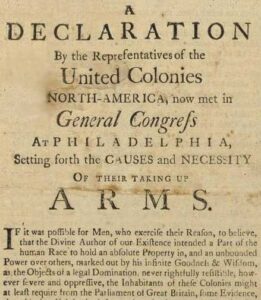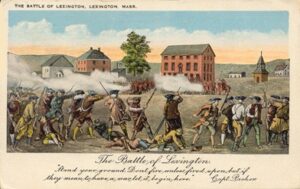 Today we often celebrate and interpret the Declaration of Independence (which soon turns 250) outside its historic context. But there would not have been a Declaration of Independence if there had not been A Declaration Setting forth the Causes and Necessity of Their Taking Up Arms. Ratified by the Second Continental Congress on July 6, 1775, a full year before the more familiar document, it sets forth the reasoning for full separation while still hoping for reconciliation.
Today we often celebrate and interpret the Declaration of Independence (which soon turns 250) outside its historic context. But there would not have been a Declaration of Independence if there had not been A Declaration Setting forth the Causes and Necessity of Their Taking Up Arms. Ratified by the Second Continental Congress on July 6, 1775, a full year before the more familiar document, it sets forth the reasoning for full separation while still hoping for reconciliation.
One reason Americans need to understand this document is the fact that it is based upon the doctrine of interposition, which is the theological foundation for the lawful resistance to tyranny. It was understood that lawful resistance was approved by God, but rebellion made Him our adversary.
Though distant from most American thought today, it was the theological roots of interposition, “the process of coming between a tyrant and the people,” that was clearly in the minds of civil magistrates at the time because of what they heard from the pulpits of colonial America. Theologians of the Reformation (Aquinas, Luther, Calvin and others) faced this question: When civil government in general and kings in particular overstep their bounds, how does God want us to respond lawfully?
As examples, Vindicae Contra Tyrannos (in 1579) and Rutherford’s Lex Rex (the “law is king” – 1644) set forth the doctrine of interposition. Resistance to tyrannical rule is only permissible under authority – either in self-defense or under the lesser magistrate. In other words, individuals must demonstrate submission at lower levels of authority to resist lawfully at higher levels. James 4:7 depicts this truth by stating: “Submit to God. Resist the devil and he will flee from you.”
When Egypt commanded Hebrew midwives to kill their male children, they interposed themselves, deceived the government, and “God dealt well with the midwives” (Exodus 1:20). When Queen Athaliah seized the throne of Judah by force and overstepped her jurisdiction, Jehoida interposed as a lower magistrate and restrained her (2nd Kings 11). When Uzziah as a civil magistrate attempted to burn incense as a priest, overstepping his bounds, Azariah interposed as a lower magistrate, and God struck Uzziah with leprosy (2nd Chr. 26). In all these cases, fearing God meant demonstrating submission to Him under law so that we might not resist tyranny directly, incurring His wrath.
 The greatest fear of the clergy and the civil magistrates who attended their churches was that if they did not resist lawfully, the Supreme Sovereign of the Universe would be their adversary. There is no way you can win a righteous war when God opposes you! The Second Continental Congress made their point when they wrote that the British army “made an unprovoked assault on the inhabitants of… Lexington.” Pastor Jonas Clarke, an eyewitness, documented that the British fired first in his one-year anniversary sermon of April 19, 1776. This was also confirmed by many legal depositions.
The greatest fear of the clergy and the civil magistrates who attended their churches was that if they did not resist lawfully, the Supreme Sovereign of the Universe would be their adversary. There is no way you can win a righteous war when God opposes you! The Second Continental Congress made their point when they wrote that the British army “made an unprovoked assault on the inhabitants of… Lexington.” Pastor Jonas Clarke, an eyewitness, documented that the British fired first in his one-year anniversary sermon of April 19, 1776. This was also confirmed by many legal depositions.
Consider what Jesus taught when He stated in Matthew 5:38-41 that we should not make minor offenses major ones, instead “turning the other cheek,” or avoiding conflict. The Second Continental Congress declared that: “Our forefathers… left their native land, to seek on these shores a residence for civil and religious freedom.” However, in violation of their written charters, Parliament has “undertaken to give and grant our money without consent, though we have ever exercised an exclusive right to dispose of our own property.” From 1660 to 1764, Parliament passed laws restricting navigation and economic productivity without the consent of colonial assemblies as required by law. The colonies turned the other cheek with little resistance except to avoid the negative consequences as best they could.
Jesus stated in Matthew 18:15-18 that when conflicts occur, it is best to appeal to the authority directly (peacefully and privately) to attempt a restoration of relationships. Congress stated that, “We for ten years (1764-1774) incessantly and ineffectually besieged the throne as supplicants; we reasoned, we remonstrated with parliament, in the most mild and decent language.” All this was to no avail.
In the spirit of Matthew 18, calling more witnesses, and in response to royal Governors dissolving the colonial assemblies (miniature parliaments), “A Congress of delegates from the United Colonies was assembled at Philadelphia” (the First Continental Congress.) This was the lower magistrate, so that they could conduct civil redress lawfully under authority. Acts 25:11 indicates that Paul the Apostle, as a Roman citizen, appealed in this way, utilizing lawful interposition as well.
The First Continental Congress in 1774 enacted a further peaceful measure of resistance, an economic boycott. Jesus taught this as a proper action in Matthew 10:14 when he indicated that if a city does not treat you well, you can “shake off the dust of your feet.” This was a form of boycotting – refusing to do business. Congress stated, “We have pursued every temperate… respectful measure; we have even proceeded to break off our commercial intercourse with our fellow-subjects, as the last peaceable admonition, that our attachment to no nation on earth should supplant our attachment to liberty.”
Having followed these peaceful steps of resistance over a period of 115 years, Congress stated that the “unprovoked assault… commenced by the British troops… butchered our countrymen… burnt Charlestown… our ships and vessels are seized… we are reduced to the alternative of choosing an unconditional surrender to the tyranny of irritated ministers, or resistance by force.” Though Jesus did not want His disciples to fight to keep Him from being crucified, He made it clear that there would come a time when he who has no sword should buy one (Luke 22:36.) The last resort is resistance by force if conducted in self-defense.
Congress closed with powerful words that kept open the goal of reconciliation:
“Our cause is just… We gratefully acknowledge… his Providence would not permit us to be called into this controversy, until we were grown up to present strength… we most solemnly, before God and the world, declare, that, exerting the utmost energy of those powers, which our beneficent Creator hath graciously bestowed upon us, the arms we have been compelled by our enemies to assume, we will, in defiance of every hazard, with unabating firmness and perseverance, employ for the preservation of our liberties; being with one mind resolved to die freemen rather than to live slaves… we mean not to dissolve that union which has… so happily subsisted between us… We fight not for glory or for conquest… With an humble confidence in the mercies of the supreme and impartial Judge and Ruler of the Universe, we most devoutly implore his divine goodness to protect us happily through this great conflict, to dispose our adversaries to reconciliation on reasonable terms, and thereby to resolve the empire from the calamities of civil war.”







